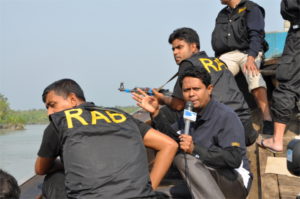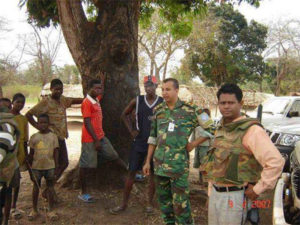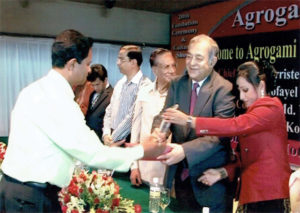
Hasan Mahmud reporting on an elite security force operation against pirates in the coastal area of Sundarban, Bangladesh. Photo courtesy of Hasan Mahmud.
Hasan Mahmud is a Bangladeshi investigative broadcast journalist, writer and social worker. He has been an editor of Weekly Sunday Line since June 2010 and served as special correspondent and chief crime reporter of TV channels Diganta Television and Jamuna Television, working on investigative desks for both outlets. Mahmud covered the United Nations peacekeeping mission in South Sudan in 2007. He has reported in Bangladesh and from many other countries around the world.
Hometown: Dhaka, Bangladesh.
Education: Masters degree in political science, Dhaka University, 1991.
Languages you speak: English and Bangla.
First job in journalism: I started working for Bangladesh’s most-circulated independent broadsheet and oldest newspaper, The Daily Inqilab, in 1991.
Countries reported from: Bangladesh, the United States, Greece, Saudi Arabia, Switzerland, Italy, Bahrain and South Sudan.
When and why did you join the OPC? I joined the OPC in 2016. I think the OPC is a very old and prestigious journalist organization, and I feel lucky to have met with OPC Executive Director Patricia Kranz in New York while I was covering the United Nations General Assembly. The OPC is a way of staying in touch with colleagues around the world.

Hasan Mahmud, center, reports on the UN peace-keeping mission in South Sudan in 2007. Photo courtesy of Hasan Mahmud.
What do you make of the state of press freedom in Bangladesh at the moment? I am saddened by this situation. Very recently, a council of editors in Bangladesh, as well as journalists, were speaking out against a new law that restricts press freedom. My colleagues there are fighting hard for press freedom.
Major challenge as a journalist:
Journalism is a very challenging job in Bangladesh. We face new problems, including abductions of journalists and intimidation from those who want journalists silenced.
Best journalism advice received:
“Safety first.”
Worst experience as a journalist:
Covering the massive civil war that continued for 22 years in the South Sudan. Up to 300,000 people are estimated to have been killed in the war overall. As a journalist covering the war in 2007, I witnessed killing and brutality. But this year in 2018, along the Bangladesh-Myanmar border, I saw brutality again, this time against the Rohingya people.
When traveling, you like to…
I like to travel in the winter.
Hardest story: Interviewing pirates in the Bay of Bengal.
Journalism heroes: Elizabeth Cochrane Seaman, her pen name Nellie Bly, an American journalist who was widely known for her record-breaking trip around the world.
Dream job: Investigative reporting.
Favorite quote: “Education is the most powerful weapon which you can use to change the world” – Nelson Mandela

The 17th Chief Justice of Bangladesh, Tafazzul Islam (second from right), presents the 2010 Agragami Samajek Sengs-kretik Selpi Gusti Award to Hasan Mahmud, (far left) at the Pan Pacific Sunargon Hotel in Dhaka, Bangladesh. The award honored Mahmud’s investigative work for the satellite TV channel Diganta. Photo courtesy of Hasan Mahmud.
Place you’re most eager to visit:
Switzerland
Most over-the-top assignment:
I was in Sundarban in Bangladesh to report on pirate kidnappings. It is the largest contiguous coastal mangrove forest in the world, and is considered one of the world’s greatest natural wonders. One day, during that reporting trip, I suddenly found myself facing down a large Royal Bengal Tiger.
Most common mistake you’ve seen:
When political leaders in my country talk publicly, they make mistakes constantly.
Country you most want to return to:
There is a very popular place in the old part of Dhaka. I want to return there.
Twitter handle: @HasanMa27658135
